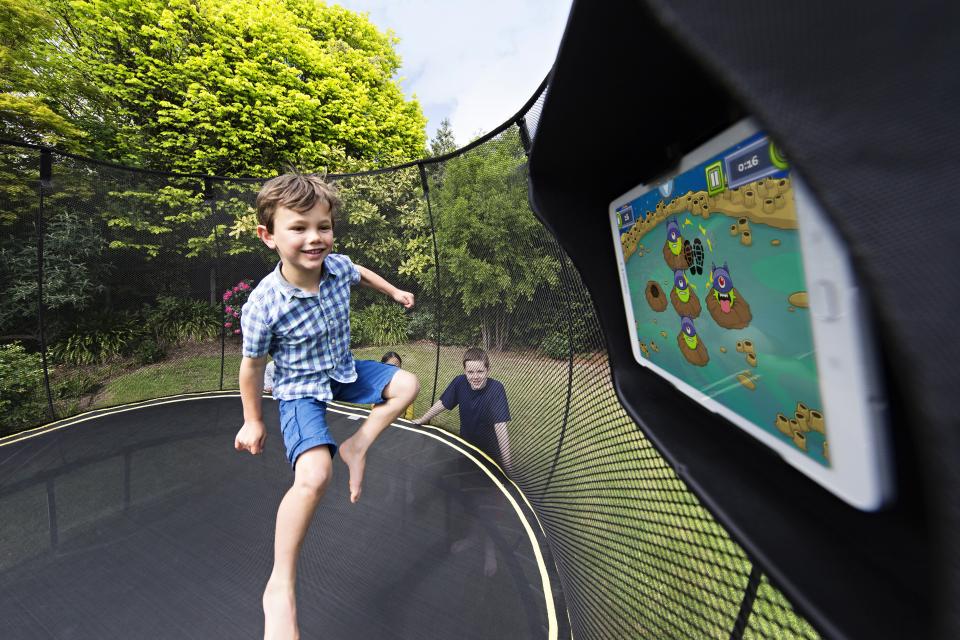Kiwi invention targets global childhood inactivity
Wednesday, 11 May 2016
A New Zealand invention created by sports science academics and an award winning local exporter is set to help address global childhood inactivity.
The patented fitness technology, developed with physiologists from Canterbury University utilises a unique signal processing algorithm to enable a trampoline user to emulate the ‘swipe’ movements on a tablet in a series of specially designed gaming apps.
The system uses mat sensors to detect trampoline jump location, jump height, and even calorie-burn rate, and converts it using a patented algorithm to enable the jumper to play games using their entire body as the controller.
Created by Christchurch-based Springfree Trampoline the innovative new device was designed to encourage more active play for Kiwi kids.
International studies show that some kids are spending more than 60 hours per week consuming media and less than 60 minutes playing outside.
The tgoma – an acronym for ‘take gaming outside & make it active’ – was created to re-direct children's passion for digital technology and make it a physical activity.
Jonathan Collins, tgoma product manager says the device leverages technology to shift screen time from being a sedentary activity to being an active experience, with significant wellness benefits.
“The gamification of fitness is a rapidly growing trend globally, essentially it is bringing together elements of the digital gaming industry and augmenting traditional fitness activities. The aim is to find new ways to engage the mind as well as the body during exercise,” says Collins.
Dr. Carl Petersen, from Canterbury University says the technology underlying tgoma is new and involved extensive research and testing.
Dr Peterson says from there the device was calibrated with university students paid to jump over 1.2 million times.
Professor Barry Taylor – Dean of the Dunedin School of Medicine, University of Otago says obesity continues to be an issue for New Zealanders with the condition likely to overtake tobacco as the leading preventable risk to health in New Zealand within the next 12 months.
The New Zealand Health Survey shows over 30 percent of New Zealand children aged two to 14 are either obese or overweight. Increasing inactivity from sedentary device use is a contributing lifestyle factor, he says.
Collins says the tgoma gaming ecosystem is also designed to encourage Kiwi app designers to add their creations and earn revenue.
“Springfree featuring tgoma integrates with the user's own digital tablet and includes educational games and fitness tracking features. Players can participate in worldwide competitions and compare their high scores with friends, family and participants all over the world,” he says.
As well as games for kids, tgoma includes a trampoline fitness app created by New Zealand National Trampoline Team coach, Angie Dougall.
“Our research showed that while parents were aware of the benefits of trampolining there is little available to motivate them to utilise the backyard trampoline as a serious piece of exercise equipment. Angie’s tgomaFit app effectively brings a world-class trainer conveniently to backyards and gives parents a legitimate reason to also get active,” says Collins.
The first production run of 10,000 units of tgoma was oversold - with the brand now trying to keep up with US demand. The company expects to ship 25 containers of product (each containing 2000 units) in the remainder of this calendar year alone with a jump in production expected next year.
"We are exporting to the US, Canada, Australia as we speak and can’t keep up with demand," says Collins. "We’re currently producing numbers in the tens of thousands of units, and everything we’re producing at the moment is being exported to the US to meet demand for their upcoming summer season.
"As soon as we’ve met 2016 demands of the North American market we’ll launch into UK and Europe for the 2017 season."


